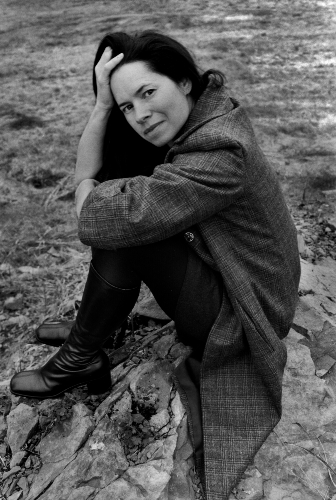Natalie Merchant singing at Smith Center

If it seems as if Natalie Merchant just sort of vanished, you’re not that far wrong.
“I pretty much gave up touring in 2001,” says the singer. “I figured I probably played 1,600 shows in 20 years.” She phrases that first calculation as “sixteen-hundred.” But she rephrases it for emphasis: “I figured I’d been in one thousand, six hundred hotel rooms. I did the math and it was a little horrifying.”
As the ethereal voice of 10,000 Maniacs, Merchant was synonymous with the ’90s. Twenty years ago this week, she sang at MTV’s “Rock ‘N Roll Inaugural Ball” for Bill Clinton.
But now, she says, “I feel like I don’t really live in the same country as most Americans. I don’t really participate in the media circus.”
Good thing she’s probably not the singer you dream of taking on in “Grand Theft Auto,” or cozying up with for a marathon of “The Walking Dead.”
“I haven’t had a television in my house since 1974,” she says. “That in itself really separates my culture from most other people’s culture. I’ve never played a video game, I can’t go to R-rated films. I can’t see any kind of violence on the screen. Because I feel like I’m witnessing a hideous crime. … The anxiety of it is overwhelming. I just can’t do it.
“When I do check in, when I’m exposed to a television, I’m just shocked. The ante’s been upped so many times. It’s painful to watch.”
And she even prefers a bit of physical isolation in a rural area near Albany, N.Y. “I also insist on working in small residential and rural studios because I feel like the worse kind of cell coverage, the better,” she says with a laugh.
Musicians “take the train up from the city and they enter my world. When you work in the city, they go out to get a sandwich and they come back really distracted. There are certain brain wave activities that I think happens when you remove distractions.”
What you will find Merchant doing is taking care of her 9-year-old daughter, joining a New York state protest against hydraulic fracturing, and singing two or three concerts a month with orchestras.
The latter brings her to The Smith Center for the Performing Arts on Tuesday, and she will stick around to sing for local school students the next afternoon.
The orchestral dates are “really satisfying,” Merchant says, on both an artistic and practical level.
She contracts orchestra musicians in each city, and doesn’t keep a band on retainer. That not only keeps costs down, but steers the music away from the “pops formula”: an orchestra playing behind a band, expanding a song rather than reinventing it.
“I’ve shown up for sound check and they’ll say, ‘Where are the amplifiers?’ We don’t have amplifiers. I’m there to sing with the orchestra,” she says. “I find that really beautiful, that I can be almost whispering and meanwhile there’s a 26-piece orchestra playing.
“The orchestrations are very well-written and challenging in places. And that makes the orchestras really happy,” she adds.
The shows incorporate much of Merchant’s 2010 album “Leave Your Sleep,” an expansive two-disc collection that sets children’s poems from all eras to music.
“It’s not like I go out and play my greatest hits with an orchestra,” she says. “I’m actually preforming a really wide variety of material and much of it’s new to people. And they really seem to enjoy it.
“I’m really lucky I have cultured a fan base, and they’re open-minded people who are willing to take a look at what I have next,” she adds. “A lot of audiences just want to hear the same song you wrote 30 years ago.”
That would certainly be the easier road. Merchant says she is now without a manager, which is perhaps understandable after the last two unsuccessfully begged her to go out with a band and sing Maniacs hits such as “These Are Days” and “What’s the Matter Here?”
Like most veterans of life before file-sharing, Merchant has mixed emotions about how quickly the music industry changed. She says 130 musicians played on “Leave Your Sleep,” which drafted gospel singers, orchestral musicians, jazz trumpeter Wynton Marsalis and the Irish band Lunasa.
But the self-financed album still has her more than $200,000 in the red.
“By today’s standards it did well. It sold a quarter-million copies. But the budget was $700,000.”
Merchant now is recording new songs for another album of self-penned tunes that could be finished by summer. But even if the nostalgia circuit could pay down some debt from the last one, it’s not a road she’s ready to travel.
“I feel a nostalgia for how flexible my body was in the ’90s, and how I could work really late and wake up the next day and function,” she says with a laugh.
But musically? “I never think of myself as having more than two hits anyway,” she says. “I find a lot of artists, their legacy is one of two songs they’re doomed to be known for, and that’s all they play.”
Luckily, Merchant says more of her fans follow the voice and not the songs.
“It’s almost like I’m sitting around the campfire with people at this point,” she says. “There’s room for me to grow and change. My audience is letting me do that, going with me.”
Contact reporter Mike Weatherford at
mweatherford@reviewjournal.com or 702-383-0288.
Natalie Merchant
7:30 p.m. Tuesday
Reynolds Hall at The Smith Center, 361 Symphony Park Ave.
$29-$99 (749-2000)


















